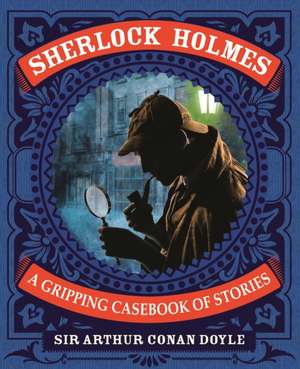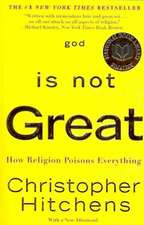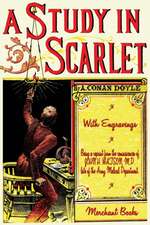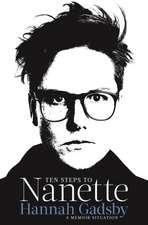Sherlock Holmes: A Gripping Casebook of Stories: Arcturus Slipcased Classics
Autor Arthur Conan Doyle Ilustrat de George Wylie Hutchinsonen Limba Engleză Hardback – 31 oct 2019
Arthur Conan Doyle's A Study in Scarlet marks the first appearance of Sherlock Holmes, the world's most famous literary detective. Enjoy Sherlock Holmes' very first adventure in this elaborate edition that will delight any Holmes enthusiast. Doyle's original text in a beautiful edition Handy 5"x8" book format - perfect for reading Pleasant typeset, uncongested layout Beautiful-looking addition to any book collection A must-read - Sherlock Holmes' very first case
About the Book: Together with his trusted friend and assistant Dr. Watson, Sherlock Holmes investigates a puzzling murder case. While the first half of the novel is set in London, the story then flashes back to the Salt Lake Valley (in modern Utah) years earlier. Both plot lines eventually meet and culminate in a fascinating conclusion that includes everything readers love about Sherlock Holmes stories. From today's perspective, A Study in Scarlet's non-linear structure feels surprisingly modern.
Rediscover this favorite masterpiece as part of the WJS Classics Edition This edition brings back renowned international works of literature to today's audience. Enjoy Doyle's A Study in Scarlet in a modern layout and comfortable typeset - optimized for a convenient and pleasant reading experience.
About the Edition: WJS Classics is dedicated to bringing you the world's greatest literary works in exceptional quality, curated by Walter J. Simmons. We place special emphasis on formatting quality and pleasant readability. Our books are not just mere scans and reproductions. All texts are edited and formatted by human editors to quarantee the best possible reading experience. We compare texts with the original or early prints, remove formatting inconsistencies (unless they are apparently intended by the original writer). In some carefully selected cases, we may provide occasional comments, translations, or explanatory annotations, where appropriate. Our notes are always clearly marked as such, so that they are unambiguously distinguishable from annotations by the original writer. In summary, readers who wish to enjoy works from the canon of classic literature need not look any further than WJS Classics to find an edition that meets the high quality they expect."
| Toate formatele și edițiile | Preț | Express |
|---|---|---|
| Paperback (9) | 37.53 lei 3-5 săpt. | |
| SWEET CHERRY PUBLISHING – feb 2021 | 37.53 lei 3-5 săpt. | |
| Bantam Classics – 31 aug 2003 | 41.38 lei 3-4 săpt. | +20.38 lei 6-12 zile |
| Bantam Classics – 31 aug 2003 | 48.35 lei 3-5 săpt. | +21.49 lei 6-12 zile |
| CreateSpace Independent Publishing Platform – | 53.79 lei 3-5 săpt. | |
| Random House LLC US – 14 apr 2020 | 92.62 lei 3-5 săpt. | +26.15 lei 6-12 zile |
| Random House LLC US – 14 apr 2020 | 92.62 lei 3-5 săpt. | +26.15 lei 6-12 zile |
| Penguin Books – 27 ian 2016 | 110.42 lei 22-33 zile | +44.98 lei 6-12 zile |
| UNION SQUARE & CO – 4 iun 2019 | 119.52 lei 3-5 săpt. | +33.88 lei 6-12 zile |
| BEDFORD BOOKS – 31 oct 1993 | 246.18 lei 3-5 săpt. | |
| Hardback (6) | 82.19 lei 22-33 zile | +32.65 lei 6-12 zile |
| EVERYMAN – 24 oct 1996 | 82.19 lei 22-33 zile | +32.65 lei 6-12 zile |
| Arcturus Publishing – mar 2025 | 131.34 lei 3-5 săpt. | +33.76 lei 6-12 zile |
| Arcturus Publishing – 28 feb 2022 | 133.11 lei 3-5 săpt. | +40.18 lei 6-12 zile |
| Arcturus Publishing – 31 oct 2019 | 135.93 lei 3-5 săpt. | +50.48 lei 6-12 zile |
| Gröls Verlag – 5 ian 2023 | 162.93 lei 18-23 zile | +14.12 lei 6-12 zile |
| Lulu.Com – 29 iun 2016 | 313.99 lei 6-8 săpt. |
Preț: 135.93 lei
Nou
26.01€ • 27.10$ • 21.54£
Carte disponibilă
Livrare economică 13-27 martie
Livrare express 26 februarie-04 martie pentru 60.47 lei
Specificații
ISBN-10: 1789509386
Pagini: 384
Ilustrații: Hardback with slipcase
Dimensiuni: 195 x 245 x 39 mm
Greutate: 1.23 kg
Editura: Arcturus Publishing
Seria Arcturus Slipcased Classics
Notă biografică
Extras
Mr. Sherlock Holmes
MR. SHERLOCK Holmes, who was usually very late in the mornings, save upon those not infrequent occasions when he was up all night, was seated at the breakfast table. I stood upon the hearth-rug and picked up the stick which our visitor had left behind him the night before. It was a fine, thick piece of wood, bulbous-headed, of the sort which is known as a "Penang lawyer." Just under the head was a broad silver band, nearly an inch across. "To James Mortimer, M.R.C.S., from his friends of the C.C.H.," was engraved upon it, with the date "1884." It was just such a stick as the old-fashioned family practitioner used to carry--dignified, solid, and reassuring.
"Well, Watson, what do you make of it?"
Holmes was sitting with his back to me, and I had given him no sign of my occupation.
"How did you know what I was doing? I believe you have eyes in the back of your head."
"I have, at least, a well-polished, silver-plated coffee-pot in front of me," said he. "But, tell me, Watson, what do you make of our visitor's stick? Since we have been so unfortunate as to miss him and have no notion of his errand, this accidental souvenir becomes of importance. Let me hear you reconstruct the man by an examination of it."
"I think," said I, following as far as I could the methods of my companion, "that Dr. Mortimer is a successful, elderly medical man, well-esteemed, since those who know him give him this mark of their appreciation."
"Good!" said Holmes. "Excellent!"
"I think also that the probability is in favour of his being a country practitioner who does a great deal of his visiting on foot."
"Why so?"
"Because this stick, though originally a very handsome one, has been so knocked about that I can hardly imagine a town practitioner carrying it. The thick iron ferrule is worn down, so it is evident that he has done a great amount of walking with it."
"Perfectly sound!" said Holmes.
"And then again, there is the 'friends of the C.C.H.' I should guess that to be the Something Hunt, the local hunt to whose members he has possibly given some surgical assistance, and which has made him a small presentation in return."
"Really, Watson, you excel yourself," said Holmes, pushing back his chair and lighting a cigarette. "I am bound to say that in all the accounts which you have been so good as to give of my own small achievements you have habitually underrated your own abilities. It may be that you are not yourself luminous, but you are a conductor of light. Some people without possessing genius have a remarkable power of stimulating it. I confess, my dear fellow, that I am very much in your debt."
He had never said as much before, and I must admit that his words gave me keen pleasure, for I had often been piqued by his indifference to my admiration and to the attempts which I had made to give publicity to his methods. I was proud, too, to think that I had so far mastered his system as to apply it in a way which earned his approval. He now took the stick from my hands and examined it for a few minutes with his naked eyes. Then with an expression of interest he laid down his cigarette, and, carrying the cane to the window, he looked over it again with a convex lens.
"Interesting, though elementary," said he as he returned to his favourite corner of the settee. "There are certainly one or two indications upon the stick. It gives us the basis for several deductions."
"Has anything escaped me?" I asked with some self-importance. "I trust that there is nothing of consequence which I have overlooked?"
"I am afraid, my dear Watson, that most of your conclusions were erroneous. When I said that you stimulated me I meant, to be frank, that in noting your fallacies I was occasionally guided towards the truth. Not that you are entirely wrong in this instance. The man is certainly a country practitioner. And he walks a good deal."
"Then I was right."
"To that extent."
"But that was all."
"No, no, my dear Watson, not all--by no means all. I would suggest, for example, that a presentation to a doctor is more likely to come from a hospital than from a hunt, and that when the initials 'C.C.' are placed before that hospital the words 'Charing Cross' very naturally suggest themselves."
"You may be right."
"The probability lies in that direction. And if we take this as a working hypothesis we have a fresh basis from which to start our construction of this unknown visitor."
"Well, then, supposing that 'C.C.H.' does stand for 'Charing Cross Hospital,' what further inferences may we draw?"
"Do none suggest themselves? You know my methods. Apply them!"
"I can only think of the obvious conclusion that the man has practised in town before going to the country."
"I think that we might venture a little farther than this. Look at it in this light. On what occasion would it be most probable that such a presentation would be made? When would his friends unite to give him a pledge of their good will? Obviously at the moment when Dr. Mortimer withdrew from the service of the hospital in order to start in practice for himself. We know there has been a presentation. We believe there has been a change from a town hospital to a country practice. Is it, then, stretching our inference too far to say that the presentation was on the occasion of the change?"
"It certainly seems probable."
"Now, you will observe that he could not have been on the staff of the hospital, since only a man well-established in a London practice could hold such a position, and such a one would not drift into the country. What was he, then? If he was in the hospital and yet not on the staff he could only have been a house-surgeon or a house-physician--little more than a senior student. And he left five years ago--the date is on the stick. So your grave, middle-aged family practitioner vanishes into thin air, my dear Watson, and there emerges a young fellow under thirty, amiable, unambitious, absent-minded, and the possessor of a favourite dog, which I should describe roughly as being larger than a terrier and smaller than a mastiff."
I laughed incredulously as Sherlock Holmes leaned back in his settee and blew little wavering rings of smoke up to the ceiling.
"As to the latter part, I have no means of checking you," said I, "but at least it is not difficult to find out a few particulars about the man's age and professional career." From my small medical shelf I took down the Medical Directory and turned up the name. There were several Mortimers, but only one who could be our visitor. I read his record aloud.
"Mortimer, James, M.R.C.S., 1882, Grimpen, Dartmoor, Devon. House-surgeon, from 1882 to 1884, at Charing Cross Hospital. Winner of the Jackson prize for Comparative Pathology, with essay entitled 'Is Disease a Reversion?' Corresponding member of the Swedish Pathological Society. Author of 'Some Freaks of Atavism' (Lancet 1882). 'Do We Progress?' (Journal of Psychology, March, 1883). Medical Officer for the parishes of Grimpen, Thorsley, and High Barrow."
"No mention of that local hunt, Watson," said Holmes with a mischievous smile, "but a country doctor, as you very astutely observed. I think that I am fairly justified in my inferences. As to the adjectives, I said, if I remember right, amiable, unambitious, and absent-minded. It is my experience that it is only an amiable man in this world who receives testimonials, only an unambitious one who abandons a London career for the country, and only an absent-minded one who leaves his stick and not his visiting-card after waiting an hour in your room."
"And the dog?"
"Has been in the habit of carrying this stick behind his master. Being a heavy stick the dog has held it tightly by the middle, and the marks of his teeth are very plainly visible. The dog's jaw, as shown in the space between these marks, is too broad in my opinion for a terrier and not broad enough for a mastiff. It may have been--yes, by Jove, it is a curly-haired spaniel."
He had risen and paced the room as he spoke. Now he halted in the recess of the window. There was such a ring of conviction in his voice that I glanced up in surprise.
"My dear fellow, how can you possibly be so sure of that?"
"For the very simple reason that I see the dog himself on our very door-step, and there is the ring of its owner. Don't move, I beg you, Watson. He is a professional brother of yours, and your presence may be of assistance to me. Now is the dramatic moment of fate, Watson, when you hear a step upon the stair which is walking into your life, and you know not whether for good or ill. What does Dr. James Mortimer, the man of science, ask of Sherlock Holmes, the specialist in crime? Come in!"
The appearance of our visitor was a surprise to me, since I had expected a typical country practitioner. He was a very tall, thin man, with a long nose like a beak, which jutted out between two keen, gray eyes, set closely together and sparkling brightly from behind a pair of gold-rimmed glasses. He was clad in a professional but rather slovenly fashion, for his frock-coat was dingy and his trousers frayed. Though young, his long back was already bowed, and he walked with a forward thrust of his head and a general air of peering benevolence. As he entered his eyes fell upon the stick in Holmes's hand, and he ran towards it with an exclamation of joy. "I am so very glad," said he. "I was not sure whether I had left it here or in the Shipping Office. I would not lose that stick for the world."
"A presentation, I see," said Holmes.
"Yes, sir."
"From Charing Cross Hospital?"
"From one or two friends there on the occasion of my marriage."
"Dear, dear, that's bad!" said Holmes, shaking his head.
Dr. Mortimer blinked through his glasses in mild astonishment.
"Why was it bad?"
"Only that you have disarranged our little deductions. Your marriage, you say?"
"Yes, sir. I married, and so left the hospital, and with it all hopes of a consulting practice. It was necessary to make a home of my own."
"Come, come, we are not so far wrong, after all," said Holmes. "And now, Dr. James Mortimer----"
"Mister, sir, Mister--a humble M.R.C.S."
"And a man of precise mind, evidently."
"A dabbler in science, Mr. Holmes, a picker up of shells on the shores of the great unknown ocean. I presume that it is Mr. Sherlock Holmes whom I am addressing and not----"
"No, this is my friend Dr. Watson."
"Glad to meet you, sir. I have heard your name mentioned in connection with that of your friend. You interest me very much, Mr. Holmes. I had hardly expected so dolichocephalic a skull or such well-marked supra-orbital development. Would you have any objection to my running my finger along your parietal fissure? A cast of your skull, sir, until the original is available, would be an ornament to any anthropological museum. It is not my intention to be fulsome, but I confess that I covet your skull."
Sherlock Holmes waved our strange visitor into a chair. "You are an enthusiast in your line of thought, I perceive, sir, as I am in mine," said he. "I observe from your forefinger that you make your own cigarettes. Have no hesitation in lighting one."
The man drew out paper and tobacco and twirled the one up in the other with surprising dexterity. He had long, quivering fingers as agile and restless as the antennae of an insect.
Holmes was silent, but his little darting glances showed me the interest which he took in our curious companion.
"I presume, sir," said he at last, "that it was not merely for the purpose of examining my skull that you have done me the honour to call here last night and again to-day?"
"No, sir, no; though I am happy to have had the opportunity of doing that as well. I came to you, Mr. Holmes, because I recognized that I am myself an unpractical man and because I am suddenly confronted with a most serious and extraordinary problem. Recognizing, as I do, that you are the second highest expert in Europe----"
"Indeed, sir! May I inquire who has the honour to be the first?" asked Holmes with some asperity.
"To the man of precisely scientific mind the work of Monsieur Bertillon must always appeal strongly."
"Then had you not better consult him?"
"I said, sir, to the precisely scientific mind. But as a practical man of affairs it is acknowledged that you stand alone. I trust, sir, that I have not inadvertently----"
"Just a little," said Holmes. "I think, Dr. Mortimer, you would do wisely if without more ado you would kindly tell me plainly what the exact nature of the problem is in which you demand my assistance."
chapter 2
The Curse of the Baskervilles
I HAVE in my pocket a manuscript," said Dr. James Mortimer.
"I observed it as you entered the room," said Holmes.
"It is an old manuscript."
"Early eighteenth century, unless it is a forgery."
"How can you say that, sir?"
"You have presented an inch or two of it to my examination all the time that you have been talking. It would be a poor expert who could not give the date of a document within a decade or so. You may possibly have read my little monograph upon the subject. I put that at 1730."
"The exact date is 1742." Dr. Mortimer drew it from his breast-pocket. "This family paper was committed to my care by Sir Charles Baskerville, whose sudden and tragic death some three months ago created so much excitement in Devonshire. I may say that I was his personal friend as well as his medical attendant. He was a strong-minded man, sir, shrewd, practical, and as unimaginative as I am myself. Yet he took this document very seriously, and his mind was prepared for just such an end as did eventually overtake him."
Holmes stretched out his hand for the manuscript and flattened it upon his knee.
"You will observe, Watson, the alternative use of the long s and the short. It is one of several indications which enabled me to fix the date."
I looked over his shoulder at the yellow paper and the faded script. At the head was written: "Baskerville Hall," and below, in large, scrawling figures: "1742."
Cuprins
The Adventure of the Empty House
The Adventure of the Norwood Builder
The Adventure of the Dancing Men
The Adventure of the Solitary Cyclist
The Adventure of the Priory School
The Adventure of Black Peter
The Adventure of Charles Augustus Milverton
The Adventure of the Six Napoleons
The Adventure of the Three Students
The Adventure of the Golden Pince-Nez
The Adventure of the Missing Three-Quarter
The Adventure of the Abbey Grange
The Adventure of the Second Stain
The Valley of Fear
His Last Bow
The Adventure of Wisteria Lodge
1. The Singular Experience of Mr. John Scott Eccles
2. The Tiger of San Pedro
The Adventure of the Cardboard Box
The Adventure of the Red Circle
The Adventure of the Bruce-Partington Plans
The Adventure of the Dying Detective
The Disappearance of Lady Frances Carfax
The Adventure of the Devil’s Foot
His Last Bow
The Case-Book of Sherlock Holmes
The Adventure of the Illustrious Client
The Adventure of the Blanched Soldier
The Adventure of the Mazarin Stone
The Adventure of the Three Gables
The Adventure of the Sussex Vampire
The Adventure of the Three Garridebs
The Problem of Thor Bridge
The Adventure of the Creeping Man
The Adventure of the Lion’s Mane
The Adventure of the Veiled Lodger
The Adventure of Shoscombe Old Place
The Adventure of the Retired Colourman
Descriere
Includes 'The Hound of the Baskervilles', as well as the following stories: The Musgrave Ritual; The Speckled Band; The Five Orange Pips; The Reigate Squire; A Scandal in Bohemia; The Red-headed League; The Final Problem; The Empty House; The Devil's Foot; and The Hound of the Baskervilles.




















